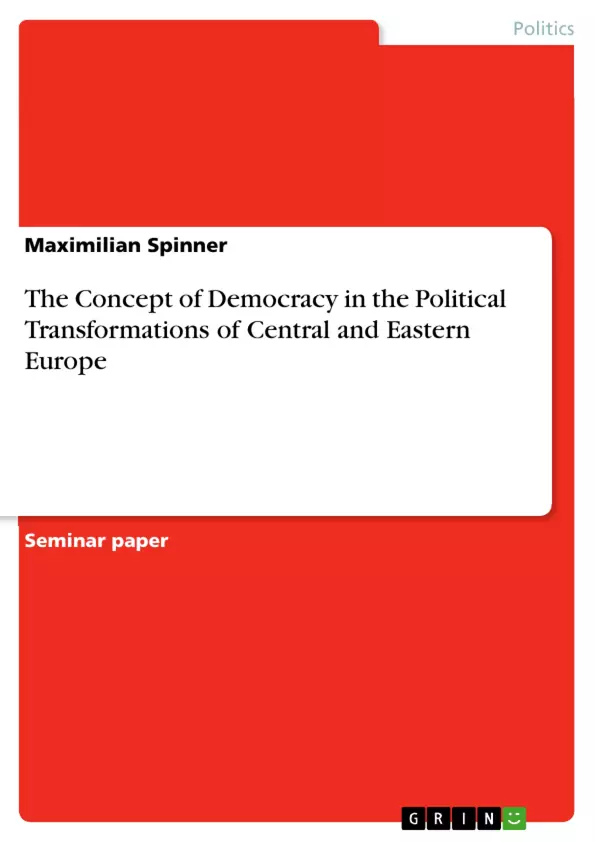Based on the Hungarian and Polish cases of negotiated transition to democracy in 1989/90 this essay looks into the philosophical concept of democracy pursued by the main protagonists.
Inhaltsverzeichnis (Table of Contents)
- Introduction
- Transformation to what kind of democracy?
- Poland and Hungary
- The Political Stalemate
- Revolution ruled out
- How ‘minimalist' was negotiated transition to democracy?
- The benefits of negotiated democratization
- The implications for the consolidation of 'negotiated' democracies
- Conclusion
Zielsetzung und Themenschwerpunkte (Objectives and Key Themes)
This paper focuses on the transition to democracy in Poland and Hungary, specifically examining the concept of democracy adopted during the round-table talks. The paper aims to understand why and how these transitions prioritized procedural aspects of democracy over broader societal participation. It explores the implications of this approach for democratic consolidation.
- The role of negotiated transitions in the democratization of Central and Eastern Europe
- The concept of democracy employed in the round-table talks
- The influence of historical context and political stalemate on the transition process
- The implications of a procedural approach to democracy for democratic consolidation
- The question of whether democracy can be introduced in a truly democratic way
Zusammenfassung der Kapitel (Chapter Summaries)
Introduction
This chapter introduces the context of the political transformations in Central and Eastern Europe, highlighting the peaceful transition from communist rule to democracy. The focus is on the round-table talks in Poland and Hungary, where negotiations between old and new elites resulted in an organized and peaceful regime change. The paper questions the democratic legitimacy of these talks, given the lack of broad participation, and aims to explore the underlying concept of democracy in these transitions.
Transformation to what kind of democracy?
This chapter delves into the nature of the transition to democracy in Central and Eastern Europe, particularly in Poland and Hungary. It discusses the concept of 'pacted' or 'negotiated' transitions, emphasizing the role of elite negotiations in shaping the course of democratization. The chapter explores the historical context leading to the round-table talks, including the crisis of communist rule, the emergence of opposition movements, and the influence of glasnost and perestroika in the Soviet Union. The chapter concludes by highlighting the significance of these negotiated transitions for the subsequent consolidation of democracy in the region.
Schlüsselwörter (Keywords)
The main keywords and focus topics of this work include: democratic transition, round-table talks, negotiated transition, procedural democracy, democratic consolidation, Poland, Hungary, Central and Eastern Europe, communist rule, opposition movements, glasnost, perestroika.
Frequently Asked Questions
Which countries are the primary focus of this study on democratic transition?
The study focuses specifically on the negotiated transitions to democracy in Hungary and Poland during 1989 and 1990.
What is meant by a "pacted" or "negotiated" transition?
It refers to a regime change characterized by negotiations between the old communist elites and the new opposition movements, often through "round-table talks."
What was the main criticism of the round-table talks regarding democracy?
The talks are often criticized for their lack of broad societal participation, as the transition was primarily driven by elite negotiations rather than grassroots democratic movements.
What is "procedural democracy" in this context?
It refers to a minimalist concept of democracy that prioritizes formal rules and procedures (like elections) over broader social and economic participation.
How did Soviet policies influence these transitions?
The introduction of Glasnost and Perestroika in the Soviet Union created the political space for opposition movements in Poland and Hungary to demand reforms.
What are the implications for democratic consolidation?
The study explores how the elite-driven nature of the transition affected the long-term stability and legitimacy of democratic institutions in Central and Eastern Europe.
- Quote paper
- Maximilian Spinner (Author), 2003, The Concept of Democracy in the Political Transformations of Central and Eastern Europe, Munich, GRIN Verlag, https://www.grin.com/document/12210



